Intergalactic Coding Camp
PROVO, Utah – Aug 19, 2022 – Justin Giboney, a professor of information systems (IS) at the BYU Marriott School of Business, routinely sends summer camp students to outer space. Each July for two weeks, high school students from the ages of 13 to 18 flock to BYU campus to attend the cybersecurity camp he leads. When the participants arrive, Giboney sets up a starship simulator in the basement of the Crabtree Technology Building and lets the students navigate through space using a series of cybersecurity challenges.
“The students love the starship and often say it’s their favorite part of camp,” says Giboney. “We have one student who has attended the camp for four years now, and she still likes the simulator best.”
When students enter the starship, they are given roles: captain, navigator, tactical expert, communications leader, scientist, or maintenance worker. Together, the campers must work together to complete cybersecurity tasks such as setting up a firewall or detecting phishing emails. If their team is successful, their “ship” stays safe from enemy ships that are projected on a screen in front of them.
“Besides the starship simulator, another activity that campers love is capture the flag,” Giboney says. While that might conjure up images of campers wearing flag belts and running across a field, the cybersecurity version is slightly different.
“In our version of capture the flag, there is a big Jeopardy-style board,” explains Giboney. “All of the squares on the board have various cybersecurity challenges that you can click on and attempt to solve. Challenges can include finding a hidden message on a website, decrypting an encrypted message, or reverse engineering computer programs. When participants complete tasks successfully, they usually find a hidden flag and score points for their team.”
Over the course of the two weeks of camp offered, almost 200 campers come to BYU to play coding games and learn about cybersecurity. Thanks to generous sponsors like Sandia National Labs and Arctic Wolf, the camp has enough funding to provide two specialized sessions. The first week of camp is for high school boys, while the second week is for high school girls. “During capture the flag, we had the same challenges—plus a few more—for the girls, and they were able to solve some that the boys could not,” Giboney says. Between 2015, the first year that the cybersecurity camp was available, and 2022, the number of female attendees has almost doubled, rising from 40 participants to 79. Giboney hopes this number will continue to grow in years to come.
In addition to enjoying cybersecurity-themed activities, campers attend daily classes where they learn from experts in the field. This year, BYU Marriott IS professor Bonnie Anderson gave a lecture on neurosecurity, which is the application of neuroscience principles in cybersecurity behaviors, and fellow IS professor Jeff Jenkins taught students about physical security, or limiting access to spaces where data is stored. As part of an object lesson, he showed students how to pick locks.
After campers participate in the various games, challenges, and lectures that make up cybersecurity camp, Giboney hopes they walk away with a couple of valuable lessons. “The two main goals of this camp are to help students begin to understand the need for safety in a digital world and to expose them to careers in cybersecurity,” he says. “There is a huge demand for cybersecurity jobs in the United States and worldwide. Students don’t always know about cybersecurity from high school classes, so they don’t know if they are a fit.”
“I came to camp last year and learned that I want to go into cybersecurity,” says Taylor J, a two-time participant in the class. “I have been taking more computer classes at school.”
Fellow camper Harmony B explains, “Even though I want to be an elementary school teacher, I know that there is a ton I can do with cybersecurity in my future job because everyone is going to need help with that.”
Regardless of whether cybersecurity camp inspires campers toward a new career path, they are guaranteed to walk away with new skills, smarter digital habits, and more practice with reaching for—and navigating a spaceship through—the stars.
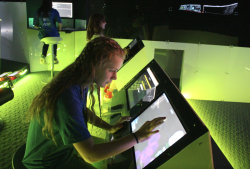
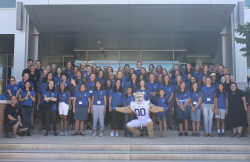
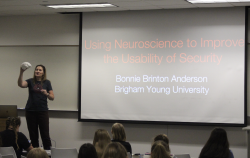
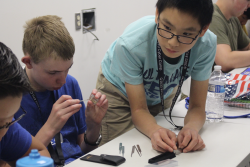
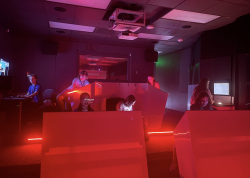
Media Contact: Chad Little (801) 422-1512
Writer: Zelle Harris



